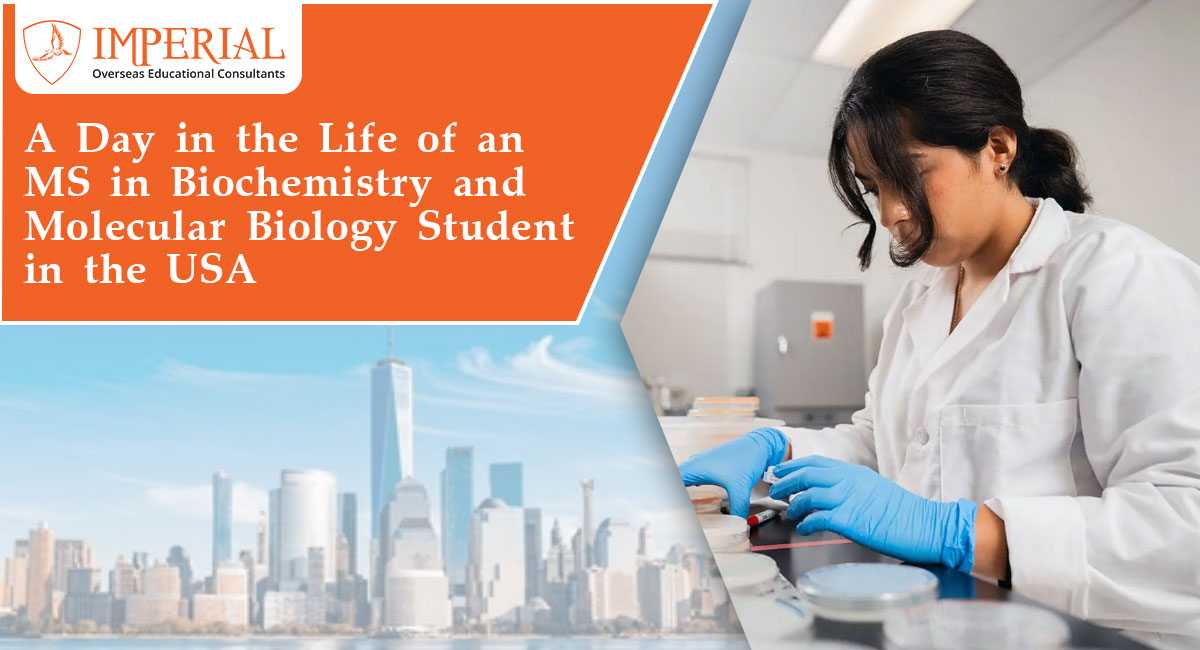
A Day in the Life of an MS in Biochemistry and Molecular Biology Student in the USA
STEM areas like biochemistry and molecular biology continue to draw people from all over the world, with over 800,000 international students in the US. If you want to get an MS in Biochemistry and Molecular Biology USA, you will be a part of cutting edge research, advanced lab methods, and a diverse academic community.
Still, students often have trouble adjusting to the tough course work, keeping track of their lab hours, and adjusting to new cultures while getting ready for PhD programs or biotech jobs in the future.
Morning Routine: Jumpstarting a Research-Focused Day
The day starts early for most MS in Biochemistry and Molecular Biology USA students. Classes start at 8 or 9 AM and cover advanced topics such molecular genetics, cell signalling, and protein structure. Students must participate in debates, present research articles, and collaborate in these courses.
A MS degree in USA offers students to pick electives in immunology, structural biology, or computational biochemistry.
Midday: Hands-on Lab Experience
A large portion of a student’s day is spent in the lab. Students collaborate with postdoctoral researchers or academics on CRISPR, DNA sequencing, and protein assay investigations for their Ms in USA. Every MS in Biochemistry and Molecular Biology USA student learns modern biotechnological techniques through inquiry-based learning.
Lab sessions are intensive and demand time management skills. The majority of research assistantships come with a stipend, therefore this is one of the most significant aspects to consider when meeting with Overseas study consultants in most pre-departure conferences on how to balance financial demands and studies.
Need help finding universities that offer lab assistantships or research funding?
Explore the world of programs, labs, and scholarship opportunities that are best suited to your academic background and research opportunities found by Imperial Overseas.
Evening: Assignments, Journals, and Seminars
Students create lab reports, study for tests, and go to guest lectures or seminars at night after they finish their lab work. Because the MS degree in USA emphasises study, it’s vital to read the most recent periodicals like Nature and Cell.
Getting to know people at these events can help you get a job or a PhD. These conversations are a big part of the Ms in USA student experience, and they often transcend beyond what is taught in class and into real-life biotech situations.
Weekend: Campus Life, Cultural Adjustments, and Part-Time Jobs
Weekends are a good time to both relax and get things done. Some of the things that students can do on campus are go to culture events, visit research facilities, or work part-time. These parts of the MS in Biochemistry and Molecular Biology USA program make the whole experience richer.
Overseas study consultants can also help you adjust to your new culture by giving you useful advice before you go, on everything from what to eat to how to behave in school.
Conclusion
It is mentally stimulating and professionally rewarding to get an MS in Biochemistry and Molecular Biology USA. The commitment is worth it because of the tough classes, chances to do study, and job prospects. But getting ready is important if you want to do well in school, with friends, and with your emotions.
Ready to Study in the USA?
Imperial Overseas is here to help you if you want to get an MS in the US but find the process too hard to handle. They help students who want to study abroad with everything, from choosing courses to writing their SOPs.
For students interested in getting an MS degree in USA, including the MS in Biochemistry and Molecular Biology USA, Imperial Overseas offers expert counseling. Get in touch with their team right away to get step-by-step help from Overseas study consultants who know what you’re going through and your academic goals.
FAQs
Yes, many colleges let you easily move on to PhD programs based on how well you did in your MS and how much research you did.
Yes, many colleges offer teaching assistantships that can help pay for school while also helping you learn how to teach and talk to people better.
Pharma, biotech, and clinical research are common places for graduates to work. They do things like research and development, quality control, and data analysis.
Universities have buddy programs, counselling, and clubs for foreign students to help them get used to a new culture.



